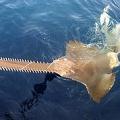 在一場討論有關瀕絕物種貿易的聯合國大會上,來自171國政府代表日前已通過對鋸鰩(sawfish)的國際貿易限制,鋸鰩是一種類似鯊魚、有著獨特齒狀口鼻的大型魟魚;此外,與會代表也通過保護歐洲鰻的決議。
在一場討論有關瀕絕物種貿易的聯合國大會上,來自171國政府代表日前已通過對鋸鰩(sawfish)的國際貿易限制,鋸鰩是一種類似鯊魚、有著獨特齒狀口鼻的大型魟魚;此外,與會代表也通過保護歐洲鰻的決議。
但根據發表於此次會議的簡報顯示,因部分國家的執行力不足,使得組織性的環境犯罪猖獗,程度與毒品、人口販賣、持槍犯罪以及洗錢等非法活動相當。
是次會議為華盛頓公約(CITES)的一部分,在11日的議程中,與會者決議,全球7種鋸鰩之中的6種列入「附錄一」名單,亦即全面禁止針對該類物種的貿易行為。不過,肯亞與美國則提出另一項聯合議案,希望7種鋸鰩均列入「附錄一」中。
目前唯一一種未被列為高度保護的鋸鰩,為發現於澳洲的淡水鋸鰩。為了回應澳洲方面的要求,該物種已被列入公約「附件二」名單,唯一允許活體交易的條件是必須賣給公共水族館作展示用途。
International trade restrictions have been approved for sawfish – large rays related to sharks, with unique toothed snouts. European eels were also protected by government representatives from 171 countries at a United Nations conference on trade in endangered species.
But a new briefing paper released at the meeting demonstrates that because of lax enforcement in some countries, organized environment crime is now at a level to compare with drugs, human trafficking, gun crime and money laundering.
At the ongoing meeting of the Convention on International Trade in Endangered Species, CITES, delegates Monday approved six of the world's seven sawfish species for listing in Appendix I of the Convention, which bans all international commercial trade.
Kenya and the United States had submitted a joint proposal to include all seven sawfish species on Appendix I.
The one sawfish species that did not receive the highest level of protection is a freshwater sawfish found in Australia. In response to Australia's request, this species was included in Appendix II, to allow trade in live animals to public aquaria for display.
全文及圖片詳見ENS報導




